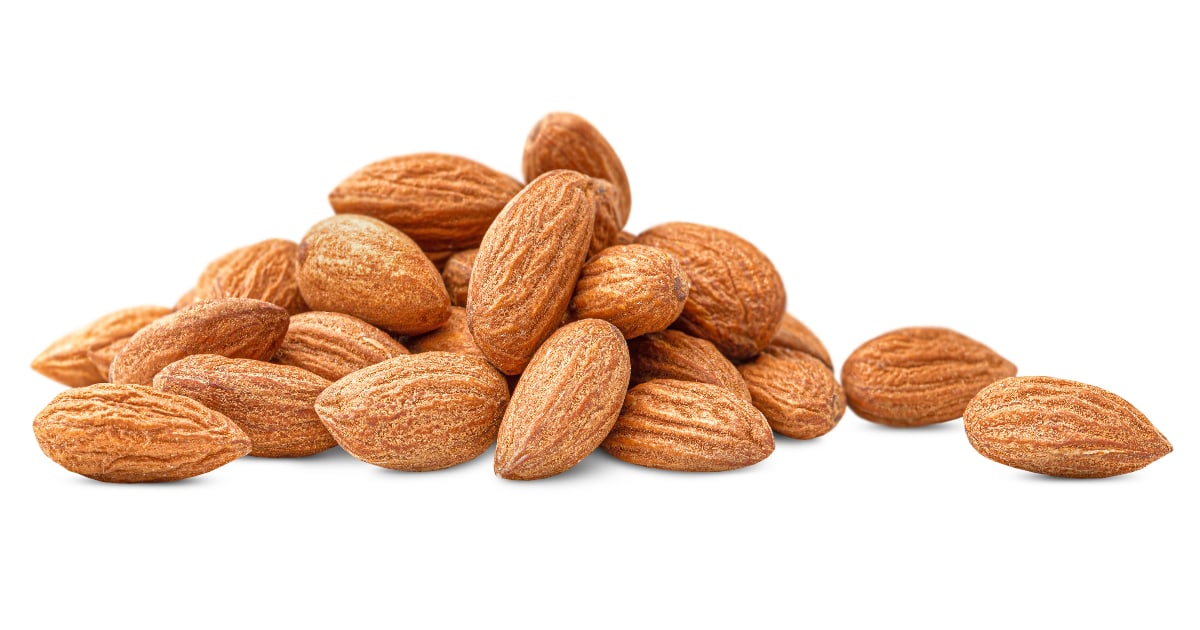Almonds are one of the most popular nuts, loved for their sweet flavor and stellar nutrient profile.

Almond butter is also growing in popularity, valued for its smooth, creamy texture and versatility.
But is one healthier than the other?
Calorie and Carbohydrate Content
When it comes to calories, almonds and almond butter are fairly comparable. A 1-ounce serving of almonds contains about 170 calories, while 2 tablespoons of almond butter provides 190 calories.
That’s just a 20-calorie difference, which you could burn off with a 6-minute workout.
Carb content is also similar. Almonds have 5 grams of carbs per serving compared to 6 grams of almond butter. Both foods are relatively low in carbs and can fit into low-carb diets in moderation.
Additionally, they both provide 3 grams of fiber per serving to help slow digestion and keep you feeling full.
Fat Content
One of the main differences between almonds and almond butter is the fat content. Almond butter contains more fat because oils are often added to improve creaminess and texture.
A 1-ounce serving of almonds has 15 grams of fat, while almond butter provides 18 grams in just 2 tablespoons.
However, the type of fat is what really counts. Both almonds and almond butter contain mostly monounsaturated fatty acids, which have been linked to a lower risk of heart disease.
They also contain polyunsaturated fatty acids like linoleic acid and alpha-linolenic acid, which provide anti-inflammatory effects.
Protein Content
Almond butter edges out whole almonds when it comes to protein content.
Two tablespoons of almond butter contains 8 grams of protein, while 1 ounce of almonds provides 6 grams.
Some research shows that bumping up protein intake can enhance feelings of fullness and increase calorie burning.
Swapping out a few almonds for a spoonful of almond butter can help amplify the protein content of your snacks and meals.
Vitamin and Mineral Content
One of the biggest benefits of almond nutrition is the stellar vitamin and mineral profile. Almonds contain a good amount of manganese, magnesium, phosphorus, copper, and vitamin E.
Although some nutrients are lost during processing, almond butter is still high in many of the same important vitamins and minerals as whole almonds.
However, there are a few key differences in specific micronutrients:
- Vitamin E: Almonds are very high in vitamin E, while almond butter contains slightly less due to processing. Still, almond butter is an excellent source of this important antioxidant.
- Thiamine: Almonds contain a good amount of thiamine, providing over 20% of the daily value in just 1 ounce. Almond butter has little to no thiamine.
- Riboflavin: Both foods are high in riboflavin, but almonds contain slightly more.
- Calcium: Almond butter is richer in calcium than whole almonds, providing almost 30% more per serving.
So while the nutrient profiles are generally comparable, almonds have a slight edge for certain vitamins like thiamine and riboflavin.
Weight Loss
Due to their stellar nutrient profile and good mix of protein, fiber, and healthy fats, both almonds and almond butter may support weight loss.
In fact, some research shows that almonds can be even more effective than complex carbs for shedding pounds.
This may be because almonds are less likely than carbs to cause spikes and crashes in blood sugar levels, which can ramp up hunger.
Chewing whole almonds thoroughly may also maximize feelings of fullness compared to eating almond butter, thanks to their crunchy texture.
However, for some people, almond butter may be more sustainable for long-term weight management. It can be easily incorporated into smoothies, oatmeal, and snacks.
No matter which you choose, moderation is key. Nuts and nut butter are calorie-dense foods. To prevent unwanted weight gain, keep portions in check and avoid overdoing it.
Cost
Almonds and almond butter are typically similar in price. However, almond butter tends to offer more bang for your buck.
Since almond butter is more calorie-dense than whole almonds, you get more calories per dollar spent. Almond butter is also more versatile, substituting for other nut butter or oils in recipes.
Buying in bulk and making homemade almond butter can further cut down on costs. However, this requires access to a high-speed blender or food processor.
Satiety

Both almonds and almond butter can promote satiety and help blunt hunger between meals.
One study gave people either whole almonds or almond butter. Although both decreased hunger and boosted fullness, almonds were significantly more satiating per calorie.
This may be because we don’t absorb all the calories from whole almonds. The act of chewing helps slow digestion, allowing some fat and calories to pass through undigested.
While almond butter offers convenience, whole almonds appear to provide superior satiety. Adding some crunchy almonds to nut butter may help amp up satisfaction.
Storage
Proper storage is important for preserving freshness and preventing almonds and almond butter from going rancid.
For whole almonds, an airtight container in the pantry or fridge is ideal. Keeping roasted almonds in the fridge may also minimize oxidation of their healthy fats.
Natural almond butter should always be refrigerated after opening. The oils tend to separate and need to be stirred together. Keeping almond butter chilled prevents spoilage.
Which Should You Choose?
So should you reach for raw almonds or almond butter? Here’s a quick summary:
- Almonds are more satiating per calorie and contain beneficial vitamins like thiamine. Go for raw when possible.
- Almond butter offers convenience, creaminess, and versatility for recipes and smoothies. Refrigerate after opening.
- Roasted almond butter provides a deeper flavor but may contain more acrylamide. Limit portions.
- Combining a small amount of almond butter with roasted almonds gives you the perks of both.
- To save money, buy raw almonds in bulk and make your own almond butter as needed.
FAQs
How many almonds should you eat per day?
The recommended portion is about 1 ounce or 23 almonds, providing 6 grams of protein and 4 grams of fiber. This makes a nutritious, satisfying snack.
What happens if you eat almonds every day?
Eating 23 almonds daily can provide anti-inflammatory effects, better blood sugar control, increased vitamin E intake, and improved satiety between meals. Stick to the recommended 1-ounce serving to keep calories under control.
Is it okay to eat raw almonds?
Yes, raw almonds are perfectly safe to eat. Look for steam-pasteurized varieties over ones pasteurized with chemicals like propylene oxide. Roasting brings out more flavor but slightly alters the nutritional profile.
Should you eat almonds in the morning or at night?
Almonds make an excellent morning snack to provide energy, minerals, and lasting fullness. They can also be consumed anytime as a pick-me-up snack. Pair with fruit to help stabilize blood sugar levels.
What happens if you eat too many almonds?
Consuming more than the recommended 1-ounce serving may cause digestive upset, unwanted weight gain, blurred vision from vitamin E overdose, or even toxicity in extreme cases. These effects are unlikely with typical intake levels.
Is almond butter as healthy as whole almonds?
Almond butter is still nutritious despite some nutrient loss from processing. However, almonds contain more thiamine and may be more filling calorie-for-calorie. Enjoying both ensures you get a variety of nutrients.
How long do almonds last compared to almond butter?
Whole raw almonds can last up to 12 months when stored properly in an airtight container. Almond butter is also kept for several months when refrigerated, thanks to its low water content. Be sure to store both away from heat and moisture.
Conclusion
Almonds and almond butter each offer unique nutritional benefits. While their calories and carbs are comparable, almonds contain more of certain vitamins while almond butter provides extra protein.
For satiety, raw almonds appear to be superior. However, almond butter can be more versatile and convenient.
To maximize the nutrition of your snacks and recipes, consider eating a combination of almonds with a small amount of almond butter. This provides the best of both worlds.

